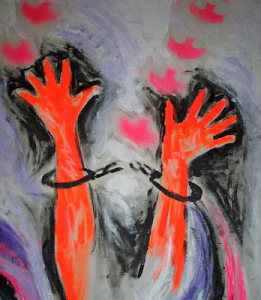As I mentioned yesterday, here are the simple, yet beautiful,
cards I had made via Shutterfly, to give to anyone who
asked about my Night Light Jewelry or Thai Tote/Itsera products.
A simple, effective, and easy way to increase awareness about
the sex trafficking industry.
Here is Part II of “Voices for the Voiceless”:
My look into the oppression of women worldwide,
particularly highlighting the sex trafficking/sex trade issue.
In no way am I even attempting to be an expert of this far-reaching problem,
but hope to somehow bring awareness and support to those who are the experts;
working tirelessly on the frontlines to combat this oppressive beast.
They are my heroes.
“By far one of the most devastating ancient breaches is the exploitation of vulnerable women, specifically concerning those trapped in the perils of sexual slavery due to impoverishment, gender inequality, or social class. In her book review of Parrot & Cummings Sexual Enslavement of Girls and Women Worldwide (2008), Clinical Psychologist, Nancy M. Sidun, cites vulnerability as a core issue in the exploitation of women and girls worldwide: ‘Sexual slavery in its varying manifestations is driven by social, cultural, political and economic factors. Women are forced to seek a better life or escape a tortuous one due to lack of economic resources, illiteracy, cultural expectations, family obligations, war and civil strife, and domestic abuse. All these elements make women more vulnerable to exploitation. Sexual slavery involving girls and women is growing and will continue to increase unless there is a universal paradigm shift that addresses the gender inequities that justify sexual slavery’ (p. 497).
The women of the Republic of Malawi, a landlocked country in Southeast Africa, live in a state of vulnerability and are therefore intimately acquainted with the great pain of impoverishment and economic strife. Malawi’s rising population currently stands at 13 million (White, 2010, p. 80). Seodi White, in her recent article, ‘Extreme poverty and its impact on women’s vulnerability to HIV transmission: a rights issue,’ explains the plight of Malawi women:
Malawi has two lineage patterns, patrilineal and matrilineal. In both societies, the position the women assume is inferior to males as decisions are primarily made by men. The distribution of poverty levels across the regions in the country also reflect the nature and character of patrilineality and matrilineal societies. For example, the southern region of Malawi, which is mainly matrilineal, is also the poorest in the country. And according to recent estimates, the current status of poverty shows that 52.4% of the population lives below the poverty line. This translates into about 6.3 million Malawians who are poor with food insecurity and chronic malnutrition being one of the most important indicators that characterize the vulnerability of the poor. And among the poor themselves, the female-headed households are normally worse off’ (2010. p. 80).
What does this mean for the Malawi woman? She faces the stark reality of providing for her children, no matter the cost of her self hood. In fact, many women feel as if they have no value at all (p. 82). White adds, ‘Poverty is a major influence that often drives women to opt for economic survival, rather than the protection of their sexual and reproductive health rights. Poverty places women in a situation where they engage in sexual activities which they would otherwise avoid if they had had more income or any income at all’ (2010, p. 81-82). Therefore, widowed or unmarried (2010, p. 82) Malawi women, in an agriculture-based society, are forced to work as tea pluckers, where in turn for low production they are forced to have sexual relations with male supervisors in order to keep their jobs. This oppression diminishing their sense of self.
Other Malawi women, living in the rural areas, have the responsibility for ‘fetching fuel wood for domestic purposes and they frequent the forest reserves on a regular basis. Women who sneak into the forests without passes or permits are sexually abused by the guards if caught’ (p. 83). And Malawi women living near Lake Malawi, near the male-dominated fishing industry, are known to trade sex for fish in order to feed their households (p. 83).
The story of the Malawi women is not an isolated story. The effects of the global economic crisis reach to the four corners of the globe; perpetuating an ever increasing state of vulnerability for women, particularly the widowed, unmarried, and impoverished. Researcher Zoe Elena Horn writes of the damages done to ‘the informal economy’ (2010, p. 263), defined by the International Labour Organization (2002) as, ‘All economic units that are not recognized or regulated by the state, and all economically active persons who do not receive social protection through their work’ (p. 263). Horn states:
Despite their strategies to balance budgets, some workers resorted to borrowing from neighborhood storekeepers, or local moneylenders. Some waste-pickers borrowed from scrap-shop owners, while home-based workers in Thailand reported borrowing from moneylenders to pay the debts piling up from other moneylenders. In these informal credit markets, workers were being charged upwards of 30 percent a month in interest. These interest payments increase financial pressure on informal workers, and reduce their earnings over the long-term. As a result, women’s economic, physical and emotional burdens are being compounded during the crisis, and the relative socio-economicvulnerability of poor working women and their families is worsening (p.270-272,273).
Senior Editor of Harvard International Review, Richard Re, affirms this global dilemma: The world’s vast disparities in wealth, education, and opportunity make this kind of slavery possible. Desperation and hope leave all too vulnerable those people most determined to escape inhumane conditions. This tactic is usually used to target girls and young women. Impoverished families in rural areas recognize a greater economic value in their male children and are often motivated by patriarchial cultural mores. When well-dressed men come offering a small monetary down payment (in one documented case, less than US$25) to transport girls away from home to work as maids or waitresses or in other possible occupations, these families often jump at the opportunity. In reality, these men are slavers who take their willing cargo to the city to be ‘broken in’ for their life of involuntary prostitution. The girls are sometimes beaten,raped, starved, or tortured until they submit to their keepers’ demands. In Mumbai, some 90,000-sex slaves work in the city’s red light district. Some 20,000 Burmese girls are believed to be held in Thai brothels (2002, p. 32-33).
Global economic decline in the Soviet Union, known currently as the Union of Soviet Socialist Republics, also struck to the heart of women and children, as the economic collapse forced closings of many factories in which the women were employed. Thus, ‘many rural women migrated to urban areas in search of employment opportunities’ (Orlova, 2005, p. 157), only to find themselves falsely informed and trapped in the sex trade. Orlova concludes, ‘Although many trafficked Russian women possess significant levels of education, work experience, and professional qualifications, they still fall prey to traffickers because of economic desperation’ (p. 165).
In light of such harsh realities that are often difficult to comprehend, many national governments, world-relief organizations, NGO’s (nongovernmental organization), Christian Mission Organizations, and NPO’s (nonprofit organizations) are raising their voices for the voiceless and rallying resources to provide relief in the form of education, community development, safe houses, rehabilitative services, life development courses, and employment all in an effort to revitalize and restore victims and their families. Step Ahead, a Christian-based integrated community development organization, based in Thailand, has spent the last twenty-five years empowering the Thai people, specifically those living in Bangkok’s largest slum, Klong Toey, by making micro loans a viable option and alternative to the oppressive money lenders. In doing so, families become self-sustaining and less vulnerable to exploitation in the sex trade, which literally is in their backyard. In 2004, after the devastating Asian Tsunami of December 26, Step Ahead launched four child development centers in an effort to educate Thai children. Typically, Thai children receive only a sixth grade education, but with these efforts being put forth, the face of Thailand’s future will be changed. No longer bound by illiteracy and impoverished communities, families can actually thrive in their ability to be self-sustaining entities. Epidemiologists Chris Beyrer and Julie Stachowiak note:
As Thai women and their families have become increasingly aware of the dangers of sex work, the number of Thai women willing to work in the sex industry has sharply declined. This has driven traffickers further afield—into tribal areas, and to Burma and Laos, to find women and girls (and parents) ignorant of the dangers of sex work. This is true for male sex workers in Thailand as well—an increasing share of gay bar and brothel workers are Burmese and tribal youths (2003, p. 109).
Step Ahead has recently partnered with Night Light International, CBN (Christian Broadcasting Network) Siam, as well as industry leaders, UNESCO, Thai church leaders, and the Thai government, inaugurating the “Stay in School Campaign”—targeting Issan, a very poor area located in Northeast Thailand. Through community programs, families will learn how to generate income, become self-sustaining, and most importantly, see local churches and ministry leaders rolling up their sleeves and actively pursuing the cessation of century-old strongholds of oppression.
‘This action will be a direct hit on the root of sexual exploitation,’ notes John H. Quinley, Founder of Step Ahead Integrated Community Development Foundation. ‘Large percentages of young girls and women come from Northeast Thailand, due to the abject poverty of their communities. By offering education, training, micro loans, life skill classes, family counseling, and community development—generational curses will be broken and the strong root of oppression dealt with’ (J. Quinley, personal communication, July 5, 2011).
It is this pattern of exemplary human service and action that will actually uproot the tendrils of centuries of oppression and bring true and lasting change. The efforts of these diverse organizations establishes a pattern for overcoming the oppressive, heavy hand of Satan, whose original intent to distort God’s divine order and subjugate the distinct and God-designed role of woman. Their unity aligns with the 1993 United Nations Declaration on the Elimination of Violence Against Women, which, as stated in this excerpt, honors the value of women:
‘Recognizing that violence against women is a manifestation of historically unequal power relations between men and women, which have led to domination over and discrimination against women by men and to the prevention of the full advancement of women, and that violence against women is one of the crucial social mechanisms by which women are forced into a subordinate position compared with men’ (1993, p. 2).
Herein lies the original mandate of Genesis 2:24-25: that man and woman would be one. It seems God desires that one not be “dominating over” or “discriminating against” the other. Mutual dependence. Mutual strength. Within this biblical text, it is never assumed or apparent that Elohim, Creator God, purposes to oppress his womanly creature or have her dominated, suppressed, discriminated, or muted. Quite the contrary.
Reformed minister and lecturer, Dr. Elijah M. Baloyi urges, ‘The duty to improve women’s position in society is not the responsibility of a few people alone, but of everyone. According to the researcher, the church has not done enough pastorally in this regard’ (2010, p. 1). In his original research, ‘A Re-Reading of John 8:1-11 from a Pastoral Liberative Perspective of South African Women,’ he delves into the patriarchal rule of men in the Jewish community of Jesus’ day. He observes:
Cultural and traditional laws, rules and regulations were shaped by men alone, for the benefit of masculine seniority at the expense of women. It is worrying that the Jewish community, from which Christianity originated, promoted the oppression of women. This might have been the reason why some cultures that received Christianity also accepted the culture of seeing women as secondary human beings'” (2010, p. 1).
________________________________________________________
Today’s thought: What can we do, in our personal lives and on a worldwide scale, to bring true freedom in Christ (Galatians 5:1). Is there something keeping you bound or oppressed? For me, it was (sense my use of past tense, WOO HOO!) the desperate need to gain the approval of others and please man. In order to truly fulfill my destiny in Christ, it was critical that I gain freedom in these two areas. It’s been PAINFUL, but oh, so freeing. Think of your life. Make one step towards freedom today.
And, worldwide, we can give, give, and give some more. ANY amount. OR, buy jewelry/purses, luggage tags, etc. from the two organizations highlighted in these posts.
Tomorrow, Part III: Jesus’s ministry to freeing women. It is so good!


